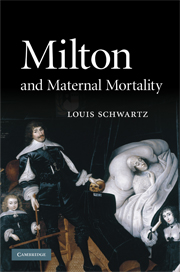Book contents
- Frontmatter
- Contents
- Acknowledgments
- Abbreviations
- Introduction
- PART I BEHIND THE VEIL: CHILDBIRTH AND THE NATURE OF OBSTETRIC ANXIETY IN EARLY MODERN ENGLAND
- 1 “Exquisitt torment” and “infinitt grace”: maternal suffering and the rites of childbirth
- 2 When things went wrong: maternal mortality and obstetric anxiety
- 3 Religious frameworks
- PART II “SCARCE-WELL-LIGHTED FLAME”: THE REPRESENTATION OF MATERNAL MORTALITY IN MILTON'S EARLY POETRY
- PART III “CONSCIOUS TERROURS”: THE PROBLEM OF MATERNAL MORTALITY IN MILTON'S LATER POETRY
- Index
- References
1 - “Exquisitt torment” and “infinitt grace”: maternal suffering and the rites of childbirth
Published online by Cambridge University Press: 04 December 2009
- Frontmatter
- Contents
- Acknowledgments
- Abbreviations
- Introduction
- PART I BEHIND THE VEIL: CHILDBIRTH AND THE NATURE OF OBSTETRIC ANXIETY IN EARLY MODERN ENGLAND
- 1 “Exquisitt torment” and “infinitt grace”: maternal suffering and the rites of childbirth
- 2 When things went wrong: maternal mortality and obstetric anxiety
- 3 Religious frameworks
- PART II “SCARCE-WELL-LIGHTED FLAME”: THE REPRESENTATION OF MATERNAL MORTALITY IN MILTON'S EARLY POETRY
- PART III “CONSCIOUS TERROURS”: THE PROBLEM OF MATERNAL MORTALITY IN MILTON'S LATER POETRY
- Index
- References
Summary
In her memoir, written in her early forties after the death of her husband, Alice Thornton offered the following account of the birth of the fifth of her nine children. The birth had occurred years earlier on December 10, 1657, and Mrs. Thornton recalls that she had recently recovered from a fall she had suffered in her home a few months earlier. She had been worried all during the intervening months that the shock of the fall would cause her to go into early labor and lose the child. She tells us, however, that she finally did carry the child to term, although this did not end her troubles:
It pleased God, in much mercy, to restore me to strength to goe to my full time, my labour begining three daies; but upon the Wednesday, the ninth of December, I fell into exceeding sharpe travill in great extreamity, so that the midwife did beleive I should be delivered soone. But loe! it fell out contrary, for the childe staied in the birth, and came crosse with his feete first, and in this condition contineued till Thursday morning betweene two and three a clocke, at which time I was upon the racke in bearing my childe with such exquisitt torment, as if each lime [limb] weare divided from other, for the space of two houers; when att length, beeing speechlesse and breathlesse, I was, by the infinitt providence of God, in great mercy delivered. […]
- Type
- Chapter
- Information
- Milton and Maternal Mortality , pp. 15 - 28Publisher: Cambridge University PressPrint publication year: 2009



